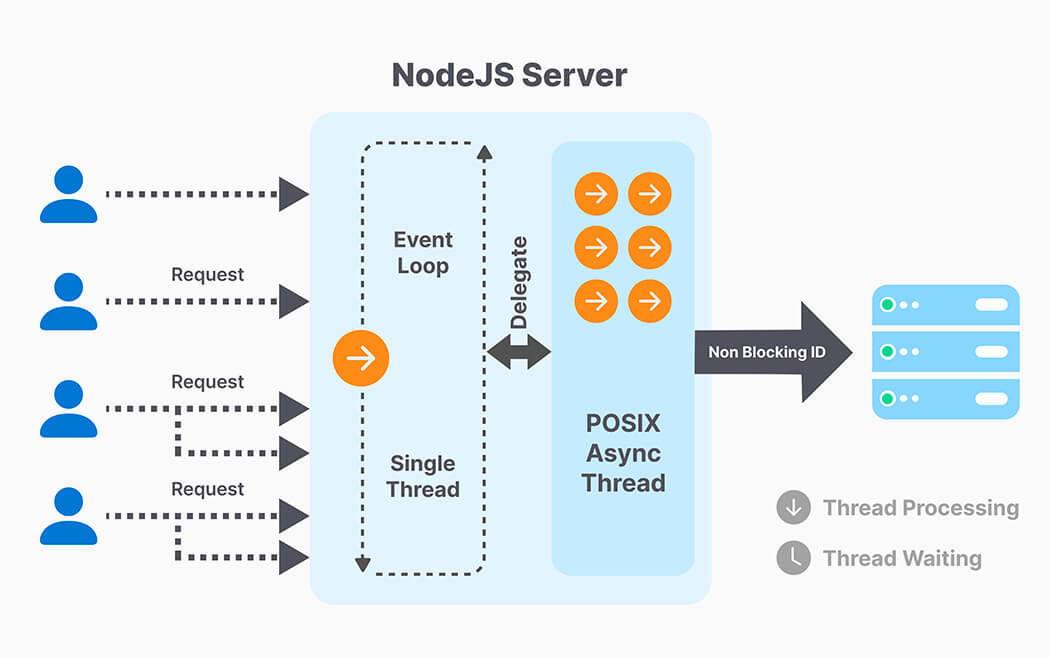NodeJS is a popular open-source framework that allows developers to build scalable, high-performance web applications. It’s built on top of the Chrome V8 JavaScript engine and allows developers to write server-side code using JavaScript, which makes it a popular choice for web application development projects. In this blog, we’ll explore the top reasons why you should choose NodeJS for your next web application development project.
High Performance
NodeJS is built on top of the Chrome V8 JavaScript engine, which compiles JavaScript code to native machine code. This allows NodeJS to handle a large number of requests simultaneously without compromising performance. Here are some reasons why NodeJS is well-suited for building high-performance web applications:
- 1. Non-Blocking I/O Model: NodeJS uses a non-blocking I/O model that allows it to handle a large number of concurrent connections without blocking the execution of other tasks. This means that NodeJS can handle a large volume of requests simultaneously, which is critical for building high-performance web applications.
- 2. Event-Driven Architecture: NodeJS is built on an event-driven architecture that enables it to efficiently handle asynchronous tasks. When an event occurs, such as a new request coming in, NodeJS can quickly process the request and move on to the next task.
- 3. JavaScript Execution Speed: NodeJS is built on the V8 JavaScript engine, which is known for its high-performance JavaScript execution. This allows NodeJS to execute code quickly and efficiently, further contributing to its ability to handle a large volume of requests.
- 4. Caching Capabilities: NodeJS has built-in caching capabilities that can help improve the performance of web applications. By caching frequently accessed data in memory, NodeJS can reduce the number of requests that need to be made to the server, thereby improving performance.
- 5. Streaming Data Capabilities: NodeJS has powerful streaming data capabilities that allow it to handle real-time data transfers efficiently. This is critical for high-performance applications that need to handle real-time data streams, such as chat applications or real-time analytics platforms.
Scalable Architecture

NodeJS was designed with scalability in mind. Its event-driven, non-blocking I/O model allows it to handle a large number of requests simultaneously, and its modular architecture allows web developers to easily scale their applications as needed. It uses a “Single Threaded Event Loop” architecture that allows it to handle multiple concurrent clients without blocking the main thread of execution.
The event loop is a mechanism that offloads I/O operations to the system kernel, which is multi-threaded and can handle multiple operations simultaneously. When an I/O operation completes, the kernel notifies NodeJS, which then executes the appropriate callback in the poll queue.
NodeJS processes input scripts and initializes the event loop, which has different phases, including timers, pending callbacks, poll, check, and close callbacks. Each phase has a FIFO queue of callbacks to execute. Node.js checks for any asynchronous I/O or timers between each run of the event loop.
This architecture allows NodeJS to handle high traffic and large-scale applications efficiently by utilizing the system’s resources effectively. Moreover, the large ecosystem of packages and libraries available in Node.js makes it easier to develop scalable applications, as developers can use pre-built modules for common tasks and focus on building the core features of their application.
Large Ecosystem of Packages and Libraries
NodeJS has a vast ecosystem of packages and libraries that can help streamline the development process through the Node Package Manager (NPM). NPM is a central repository of over 1.5 million packages, which developers can use to add functionality and features to their Node.js applications. These packages and libraries include everything from frameworks for building web applications, to modules for working with databases, to tools for building and deploying applications.
Furthermore, many third-party services and platforms integrate with Node.js, including cloud providers, databases, and messaging platforms. This means that developers can easily integrate their Node.js applications with other tools and services, without having to build everything from scratch.
Cost-Effective
NodeJS is a cost-effective choice for web application development projects. Since it’s open-source and free to use, developers can save money on licensing fees and other costs associated with proprietary frameworks.
Need to build a web application?
With cross platform compatibility, web apps remain the ultimate medium for a product. Tell us about your project for a free consult.
Conclusion
In conclusion, NodeJS is a powerful and popular framework for web application development. Its high performance, large community support, easy-to-learn syntax, scalable architecture, large ecosystem of packages and libraries, cross-platform compatibility, and cost-effectiveness make it an ideal choice for web application development projects of all sizes.










